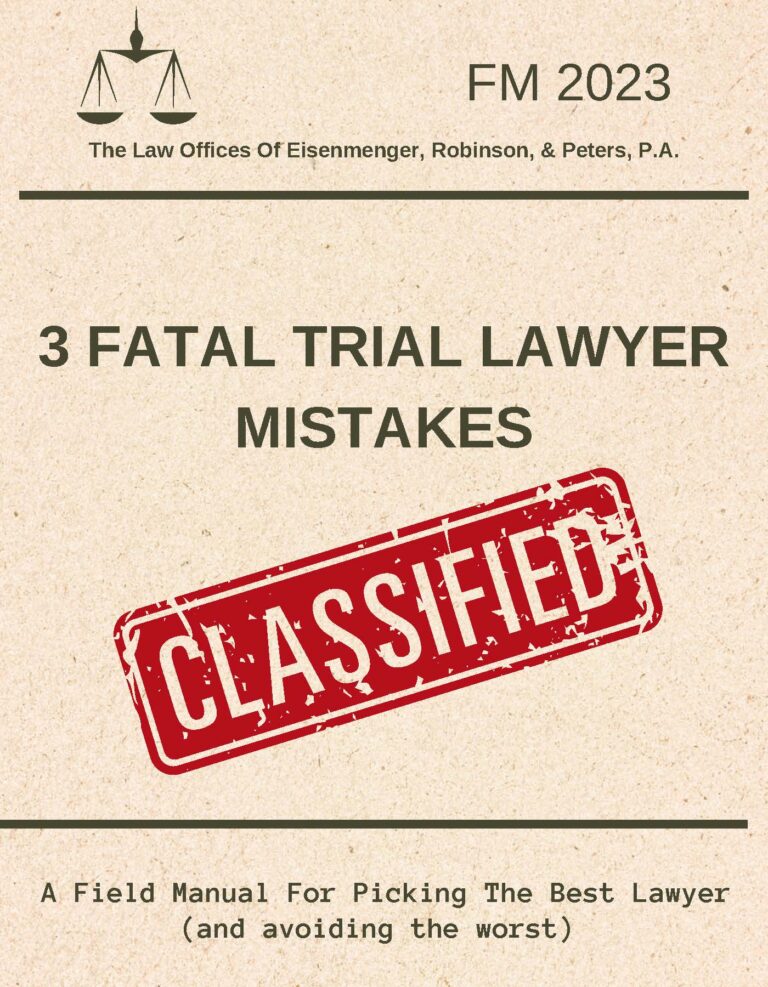Know Before You Go: 8 Sobering Facts That You Need to Know About DUIs
On behalf of Eisenmenger, Robinson & Peters, P.A. posted in Criminal Law on Wednesday, November 22, 2023.
Introduction
The holiday season is a time for celebration, but it’s also a time when incidents of driving under the influence (DUI) tend to increase. Parties, gatherings, and festivities often involve alcohol. Even if you think you are fine to drive, should you choose to drink, our advice is that you should ride home with a designated driver or with a ride service like Uber or Lyft.
While most of us know the basics of DUI laws, there are lesser-known points that can significantly impact your situation if you find yourself facing DUI charges during the holiday season. In this blog post, we’ll delve into eight crucial but often overlooked aspects of DUI cases that can make a significant difference in your life following a DUI arrest.
1) The Citation Acts as a 10-Day Driving Permit
After being arrested for DUI, if you refuse to take a breath test or if your breath test is .08 or above, your driver’s license will be suspended. The citation you receive can act as a temporary 10-day driving permit. This grace period allows you to retain an attorney and make necessary arrangements while deciding on your course of action.
2) 10 Days to Decide Whether to Challenge the Suspension or Request a Hardship License
Following your arrest, you have a 10-day window to decide whether to challenge the suspension of your driver’s license or request to waive it for the opportunity to get a hardship license during your suspension period. Your decision can significantly impact your case and your ability to drive, so it is imperative to speak with an attorney quickly.
3) You Can Request an Independent Blood Test
If you agree to take a breath test, you have the right to request an independent blood test. This can help ensure the accuracy of the results, which may be crucial to your defense.
4) You Can Refuse to Perform Field Sobriety Exercises (FSEs)
You have the right to refuse to perform field sobriety exercises if asked by law enforcement. These exercises are subjective and may not always accurately reflect your level of impairment. FSEs are not required by law, and refusing to do them will not impact your license.
5) You Can Invoke Your Right to Remain Silent
You have the right to remain silent and not incriminate yourself during any questioning by law enforcement. The officer may tell you that your Miranda rights are not applicable to DUI investigations. Politely inform the officer that you’d like to exercise your right to remain silent until you speak with an attorney.
6) Do not speak with friends or family immediately following your arrest
During a DUI investigation, officers typically do not permit individuals to speak with their attorney, friends, or family. However, following an arrest, officers often grant the opportunity for individuals to converse with friends or family in the back of the police car, all while being recorded. These conversations often become emotional and are strategically designed to extract potentially incriminating statements. Parents may confront their children, spouses may confront each other, and the arrested person might apologize or make statements like, “They messed up.” The same applies to phone calls made after an arrest. These recorded statements may subsequently be utilized as evidence to demonstrate that the arrested individual was aware of their excessive alcohol consumption.
If you need to notify someone about your arrest or make arrangements for vehicle retrieval, it is recommended to avoid taking any actions while you are still in a state of shock immediately following your arrest.
7) Breath Test Machines Have a .02 Margin of Error
In the state of Florida, for a breath test to be considered valid under the law, it must yield two readings that fall within a .02 range of each other. This legal requirement implies that breathalyzer machines commonly used to measure blood alcohol concentration (BAC) often have an inherent margin of error of approximately 0.02. In practical terms, this means that the recorded BAC may not always be pinpoint accurate, and there is room, under the law, for discrepancies.
8) A DUI conviction in Florida Requires that you are Adjudicated Guilty
In Florida, a noteworthy aspect of DUI convictions is that they typically require the individual to be “adjudicated guilty.” This means that a DUI conviction in the state of Florida often results in a formal adjudication of guilt on your criminal record, as opposed to some other states where alternative dispositions like diversion or deferred adjudication might be available for first-time offenders. It’s essential to be aware of this distinction, as it can have long-term consequences, impacting your criminal record and potentially affecting various aspects of your life, including your ability to drive, employment, and insurance rates. Therefore, seeking legal counsel and understanding the implications of a DUI conviction in Florida is crucial for anyone facing such charges.
Conclusion
As the holiday season approaches, it’s crucial to be informed about these lesser-known points regarding DUI cases. Remember that knowledge is your best defense. To learn more about the penalties you might face following a DUI arrest, DHSMV DUI Penalties. If you find yourself facing DUI charges, seek legal counsel quickly to understand your rights and options fully. You can learn more about the Benefits of working with a Defense Attorney here. Taking the appropriate steps early in the process can make a significant difference in the outcome of your case. Above all, prioritize safety, plan for designated drivers, or use alternative transportation if you’ve been drinking to ensure a safe and enjoyable holiday season.
Tags: Criminal LawDUI









